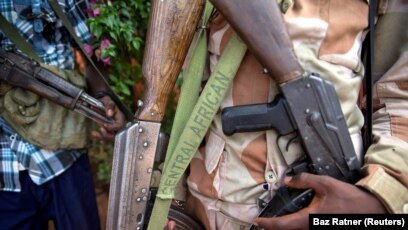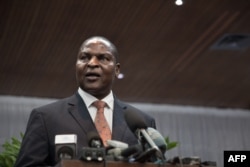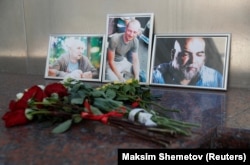Ugh! Intelligentsija on puhunut.
Anteeksi jos pilasin hyvät öyhötykset lukemalla alueen kiistoista muualtakin kuin hihhuleiden sivustoilta.
Follow along with the video below to see how to install our site as a web app on your home screen.
Note: This feature may not be available in some browsers.
Ugh! Intelligentsija on puhunut.
Behind the secret U.S. war in Africa
American special operations teams are playing a more direct role in military actions against suspected terrorists in Africa than the Pentagon has publicly acknowledged, planning and participating in combat raids by African troops in multiple countries including Somalia, Kenya, Tunisia and Niger, under a set of classified programs.
In repeated public statements, military spokespeople have said the American role in Africa is limited to “advising and assisting” other militaries. But for at least five years, Green Berets, Navy SEALs and other commandos operating under a little-understood authority have planned and controlled certain missions, putting them in charge of their African partner forces.
http://www.dailystar.com.lb/News/Wo...al&utm_source=twitter.com&utm_campaign=bufferBANGUI: Three Russians carrying press cards have been killed in the troubled Central African Republic (CAR), security and religious sources said Tuesday.
Their corpses were found on a road 23 kilometers from the central town of Sibut after apparently being killed at a roadblock by unidentified men, an investigator told AFP.
The bodies have been taken to a U.N. peacekeeping base in Sibut, the sources said. Their driver is still missing.
"They were driving back from (the northern town) of Kaga Bandoro," a religious source said.
A Russian security official reached in Bangui said Russia's representatives in the CAR were not aware of the presence of any journalists from their country.
Rich in minerals, including uranium, the CAR is one of the poorest and most unstable countries in the world.
It plunged into violence after longtime leader Francois Bozize, a Christian, was overthrown in 2013 by a mainly Muslim rebel alliance.
Former colonial ruler France intervened militarily to push out the alliance before winding down the operation.
But President Faustin-Archange Touadera, Bozize's elected successor, controls little of the country beyond the capital Bangui.
He governs with the support of a United Nations force of 13,000 troops and police, one of the biggest peacekeeping missions in the world.
Most of the CAR is controlled by 15 militias, many of which claim to represent Christian or Muslim communities but frequently clash over natural resources and revenue, which includes roadblocks.
Assaults on peacekeepers and aid workers have been frequent, but there has been no known attacks on Russians in recent memory.
Historically, the major player in the CAR has been France, but Russia has taken on a visible role since December last year, when it was authorized by the U.N. to provide the CAR armed forces with weapons and training.
The delivery was ostensibly aimed at shoring up the beleaguered central government and its chronically weak military -- an exemption to a U.N. arms embargo imposed at the outbreak of conflict in 2013.
Britain, France and the United States voiced concern, demanding that deliveries be restricted to light arms and that Russia take steps to provide traceability to prevent the weapons from being sold on the black market.
Russia is also believed to have signed a range of deals with the government since then, including security for Touadera. His security advisor is also a Russian.
In May, Touadera met President Vladimir Putin at an economic gathering in St. Petersburg, where he thanked the Russian leader for Moscow's help during "a difficult humanitarian situation" and "in the process of the country's consolidation and reconciliation."
In early July, Russia tried to set up a meeting in Sudan to mediate between the government and the militias, government sources say.
Touadera's office said the Russian initiative was dropped as "the head of state believes there is no cause to engage in other processes while the African Union one is still underway."
Hmm... Tappajat puhuivat venäjää? (Tai journalistit puhuivat jotain muuta kieltä...?)Vai onko tuo ollut venäläisten keskinäistä puuhastelua.
RUSSIA
What Are Russian Military Contractors Doing In The Central African Republic?
Last Updated: August 02, 2018 13:46 GMT

Much of the Central African Republic remains controlled by various armed formations, primarily ex-Seleka fighters and the Christian alliance known as Anti-balaka.
Share
- 190
The three Russian journalists who were killed in the Central African Republic (CAR) this week had arrived in the war-torn country to investigate the reported presence there of a shadowy Russian paramilitary force whose units are said to have fought in Ukraine and Syria.
Colleagues of Orkhan Dzhemal, Aleksandr Rastorguyev, and Kirill Radchenko say the trio were making a documentary about the private Russian military company Vagner, which French and Russian media reports had previously reported to be operating in the CAR.
CAR officials say the journalists were ambushed and killed by unidentified assailants.
The Russian government has never officially confirmed the presence of Vagner employees in the African country and denies that the firm's contractors act on Moscow's orders. The private military firm is reportedly controlled by Yevgeny Prigozhin, a longtime associate of Russian President Vladimir Putin, though Prigozhin has previously denied that he is linked to the company.
Here are five things you need to know about Russian military contractors working in the CAR.
Why Are Russian Contractors There?
The Central African Republic, one of the world's poorest countries, has been subjected to a UN Security Council arms embargo since 2013, when an armed, mainly Muslim coalition known as Seleka seized power. Christian armed formations fought back, and the violence saw thousands killed and hundreds of thousands forced to flee their homes.

The president of the Central African Republic, Faustin-Archange Touadera
In 2016, Faustin-Archange Touadera was elected president of the CAR, but much of the country remains controlled by various armed formations, primarily ex-Seleka fighters and the Christian alliance known as Anti-balaka. The UN established a peacekeeping mission in the CAR in 2014.
In December 2017, Russia secured an exemption to the Security Council arms embargo, allowing Moscow to deliver arms and training for what a UN panel of experts describes as part of a multinational effort -- including the European Union Military Training Mission -- to boost the capabilities of the CAR's military and security forces.
"Our only request was that the Russian delegation submit additional information on the serial numbers of the weapons…so that we can track weapons going into CAR," AFP cited an unidentified U.S. official as saying at the time.
How Many Are There, And What Are They Doing?
In December, Russia notified the Security Council committee overseeing the CAR arms embargo of the involvement of 175 Russian "instructors" in a training mission, according to a report by a UN panel of experts issued last week. Of those personnel, 170 were identified as civilian instructors, while the remaining five were from the Russian military, the report says.
According to the panel, Russian instructors have been involved in a range of tasks, including: escorting convoys of building materials for hospitals; providing security for hospitals donated by Russia; and training police officers as a requirement for equipping them with Russian weapons.
The panel also said that a Russian national had been appointed as a national security adviser to Touadera and that the Russian is "engaging with armed groups" to discuss issues including "disarmament, demobilization and reintegration, national reconciliation," and the sharing of revenue derived from the exploitation of natural resources.
In June, two government soldiers and one Russian instructor were wounded in an attack by militia fighters while traveling to the south of the country, the panel said.
Why Is Vagner Said To Be Operating In The CAR?
Several media reports over the past year have indicated that Vagner contractors may be working in the CAR. In March, a reporter for the Russian news site Znak.com visited a facility reportedly operated by Vagner outside the southern Russian city of Krasnodar. The reporter cited a military veteran who lives in the town where the facility is located as saying that Vagner mercenaries were set to be sent "to Africa" for a "training" mission.
Two weeks later, the Russian Foreign Ministry publicly discussed the 175 Russian "instructors," saying they had been sent to the CAR in "late January-early February," but without indicating whether the civilian personnel were employees of Vagner or another military contractor.

A memorial at the Central House of Journalists in Moscow to the three Russians killed in the CAR.
The Russian investigative journalism news site The Bell in June cited an unidentified source as saying that Vagner employees were training CAR forces. And last month, Yevgeny Shabayev, a leader of a Cossack organization who says he visited Vagner fighters injured in a deadly February clash with U.S. forces in Syria, published a letter stating that private Russian military contractors have operated in the CARand "an array of other African and Arab countries."*
An editor at the Investigation Control Center, the outlet funded by billionaire Kremlin foe Mikhail Khodorkovsky that financed the investigation conducted by the three journalists killed in the CAR, said on August 1 that the team had reached the facility where they believed Vagner operatives were stationed but were told they needed accreditation from the country's Defense Ministry.
What Is Russia's Interest?
Russia says it is seeking to restore peace in the CAR with the provision of arms and training to government forces.
"Russia's assistance is carried out as part of the common efforts of the international community to strengthen the national security units of CAR," Russian Foreign Ministry spokesman Artyom Kozhin said in a March 22 statement.
But Moscow has also made no secret of its economic interests in the country's natural resources.
"Russia is exploring the possibilities of the mutually beneficial development of Central African natural resources," Kozhin said. "The prospecting-mining exploration concessions began in 2018. We believe these projects will help stabilize the economic situation in CAR, promote the construction of the infrastructure, and serve as a basis for drawing additional investment to the country's economy."
Russian Foreign Minister Sergei Lavrov met with Touadera in the Russian city of Sochi in October, with the ministry saying that the officials "reaffirmed their countries' resolve" to bolster bilateral ties "and pointed to the considerable potential for partnership in mineral resources exploration" and energy.
Putin met Touadera in St. Petersburg in May, with the Russian leader saying that Moscow "will be happy to consider various plans to boost our relations, first of all in the economic and humanitarian fields."
What Impact Is Russian Presence Having?
While Russia touts its weapons shipments and training efforts in the CAR as an effort to stabilize the country, the report by the UN panel of experts released last week said that new weapons obtained by government forces have motivated rebel militias to boost their own stockpiles.
"The recent acquisition of weaponry by the Government has created an incentive for the active rearmament of ex-Selaka factions," the report said.
The panel added that armed militia representatives had told them that "since the government had opted for the military option (training, rearming, and attacking) instead of the political process, armed groups needed to be prepared."
The experts' report noted a worsening of the security situation in Bangui and Bambari, citing "serious outbreaks of violence, including in areas where the situation had previously improved."
*Correction: This article has been amended to clarify that Yevgeny Shabayev's letter stated that private Russian military contractors, not necessarily Vagner, have operated in the Central African Republic.
Radio Free Europe/Radio Liberty © 2018 RFE/RL, Inc. All Rights Reserved.

Carl Schreck
Carl Schreck is a senior correspondent for RFE/RL.
[email protected]
XS

ehheheheheehAfrikka, korruptio, Suomi, rahat --> Eli normi settiä.
Tässä aivan tuore motivaation lähde "avustusrahoille" JÄLLEEN kerran. Ullatus ullatus, totuusmedia ei ulise aiheesta.
Väärinkäyttöepäily Sambian sosiaaliturvaohjelmassa
Suomi tukee Sambian kansallisen sosiaaliturvapolitiikan toimeenpanoa. Työtä rahoitetaan Sosiaalisten tulonsiirtojen tukiohjelman sekä YK:n sosiaaliturvaohjelman kautta. Tuella on vahvistettu Sambian köyhimpien kotitalouksien sosiaaliturvaa. Ohjelmasta ovat hyötyneet kaikkein köyhimmät ja haavoittuvimmat kotitaloudet, erityisesti naiset ja tytöt.
Esille tullut väärinkäyttöepäily koskee sosiaalisten tulonsiirtojen tukiohjelmaa, jonka toteutuksesta vastaa Sambian sosiaaliasioiden ministeriö. Suomi on tukenut ohjelmaa neljällä miljoonalla eurolla vuosina 2016-2017.
Ohjelmaa tukevat myös Ruotsi, Irlanti ja Iso-Britannia. Suomi selvittää väärinkäyttöepäilyä yhdessä niiden kanssa, ja on aktiivisesti yhteydessä Sambian johtoon ja viranomaisiin.
https://um.fi/uutiset/-/asset_publi...oepaily-sambian-sosiaaliturvaohjelmassa/35732

Afrikka, korruptio, Suomi, rahat --> Eli normi settiä.
Tässä aivan tuore motivaation lähde "avustusrahoille" JÄLLEEN kerran. Ullatus ullatus, totuusmedia ei ulise aiheesta.
Väärinkäyttöepäily Sambian sosiaaliturvaohjelmassa
Suomi tukee Sambian kansallisen sosiaaliturvapolitiikan toimeenpanoa. Työtä rahoitetaan Sosiaalisten tulonsiirtojen tukiohjelman sekä YK:n sosiaaliturvaohjelman kautta. Tuella on vahvistettu Sambian köyhimpien kotitalouksien sosiaaliturvaa. Ohjelmasta ovat hyötyneet kaikkein köyhimmät ja haavoittuvimmat kotitaloudet, erityisesti naiset ja tytöt.
Esille tullut väärinkäyttöepäily koskee sosiaalisten tulonsiirtojen tukiohjelmaa, jonka toteutuksesta vastaa Sambian sosiaaliasioiden ministeriö. Suomi on tukenut ohjelmaa neljällä miljoonalla eurolla vuosina 2016-2017.
Ohjelmaa tukevat myös Ruotsi, Irlanti ja Iso-Britannia. Suomi selvittää väärinkäyttöepäilyä yhdessä niiden kanssa, ja on aktiivisesti yhteydessä Sambian johtoon ja viranomaisiin.
https://um.fi/uutiset/-/asset_publi...oepaily-sambian-sosiaaliturvaohjelmassa/35732
"Mittahukkaa", kuten Heidi Hautala sanoi vastaavasta Mosambikin (saattoi olla Tansaniakin. Jompi kumpi enkä jaksa tarkistaa) tapauksesta. Mulla olisi niin paljon noita tarinoita ettette usko. Tässä tapauksessa kaikkein köyhimpien rahat ovat menneet joo luksusautoihin. Sambialainen kaverini, myös kehitys-/koulutusalalla toiminut, ihan oikeasta yliopistosta valmistunut mimmi totesi tästä "Ei pennin jeniä meille ennen kuin opitaan käyttämään rahat siellä, mihin ne on tarkoitettu".
Ugandassa aikanaan maatalousministeriön avusta, viiden suurimman NGO:n osalta (DFID, USAid, WFP, JICA ja joku vielä) osalta 4/5 rahoista hukkui. Tämän laski ko. ministeriössä duunissa ollut itskukaverini. Pienempänä esimerkkinä Malawissa ministeriöiden pojat kuittasivat kalenterivuodessa yli 1100 päivää päivärahoja. Malawilainen vuosi on vaan pitempi?
Edit: Itsenäistymisaallon (1960-luvun alku) jälkeen 70-luvun puolivälin huitteille Afrikkaan tuotiin afrikkalaisten hallintojen toimesta rahassa mitaten viisi kertaa enemmän viinaa, hajuvesiä ynnä muita luksustuotteita kuin lannoitteita ja traktorinosia. Mikään ei ole noista ajoista muuttunut. Ugandan hallitus käytti 2016 enemmän rahaa omien tilaisuuksiensa caterin palveluihin kuin sikäläisen IT-sektorin kehittämiseen.
Bob Geldof itki silloin aikanaan sitä, että satasen kerättyään saa nälkäisille kaksikymppiä, korkeintaan. Afrikkalaisvaltioiden -isät- ottivat oman osansa ja pitivät tavallaan nälkäpanttivankeina omia kansalaisiaan. Hervotonta perseilyä siis. Tuskin loppunut vieläkään.
Perseilyn huippukohdissa tilanne oli monta kertaa se, että kun YKn toimittamat laivat tulivat redille, niin ne ohjattiin sivuun. Ensin purettiin neukkulaivoista aseet. Tyhjät neukkulaivat ohjattiin sivuun, YK-convoy laituriin, tyhjäksi, veks ja neukkupaatit takaisin. YK-lähetykset: ruoka, sairaalat, lääkkeet, vaatteet, pumput, kylmiöt, tekniikkaa, jopa kokonaisia MEIJEREITÄ, korjaamoita jne. neukkulaivoihin ja sillä siisti.
En suoranaisesti ihmettele, että tällaisten asioiden tultua tietoisuuteen alkoi avunantajia sylettää.
